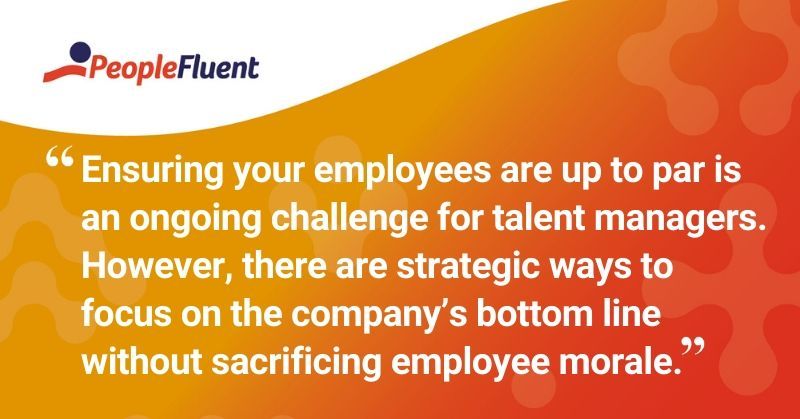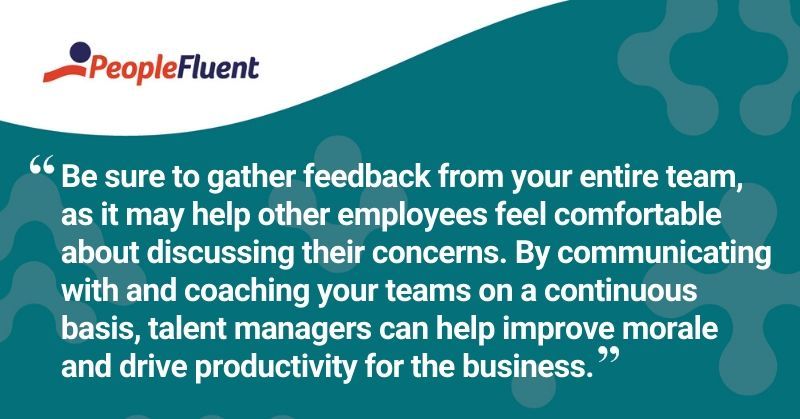Published: May 28, 2020Time to read: 7mins Category: Talent Management
4 Ways Talent Managers Can Boost Employee Morale
Employee morale is one of those intangible aspects that many organizations tend to overlook. The impact morale has on production can be both evident and hard to tackle. For talent managers, focusing on the bottom line and prioritizing performance goals is vital, but tending to the sentimental issues and feelings of your workforce can contribute to increased production and talent retention.
Morale is defined as “the confidence, enthusiasm, and discipline of a person or group at a particular time”. All of these factors have an impact on how well an employee can perform their job, which has a direct impact on an organization. That’s why ensuring your employees are up to par is an ongoing challenge for talent managers. However, there are strategic ways to focus on the company’s bottom line without sacrificing employee morale.
This blog post will discuss the ways managers can identify and minimize low morale and ways to keep employees positively engaged with the organization.

You might also like: ‘Talent Managers: An Advocate for Employees’
Identifying Low Employee Morale
During this time of uncertainty, it’s more important than ever for employees to feel valued. As the “you’re lucky to have a job” sentiment gains traction, employers may consider this a perk all on its own. Unfortunately, this viewpoint can lead to overworked employees and decreased productivity. Furthermore, future retention and training costs can also take a hit if employees continue to lack support while taking on more responsibilities to keep the business running.
If you’re an observant talent manager who takes notice of burn-out among your employees, here are four ways you can boost employee morale and stave off any negative effects to the business.
1. Continuous Coaching and Feedback
For most employees, knowing a manager will take action on their feedback is empowering. Whether the feedback is as simple as needing a day off or it’s something more, like needing more support or resources to complete their job, managers must take all feedback into consideration. In addition to listening and gathering this feedback, managers must be open to implementing change where appropriate and possible.
Throughout discussions between managers and employees, a manager may take note that the employee requires more coaching to feel comfortable in their role. Oftentimes, this may only require a confidence boost or re-alignment of priorities. However, if managers identify the need for more coaching, they should make time to ensure their employees receive the support they need. Working this into a daily routine can be a simple and rewarding process.
Be sure to gather feedback from your entire team, as it may help other employees feel comfortable about discussing their concerns. By communicating with and coaching your teams on a continuous basis, line managers can help improve morale and drive productivity for the business.
Hand-picked for you: ‘How to Get Greater Value from Your Talent Review Meetings’
2. Identify Key Performance Metrics to Develop Talent for Succession
Another reason employees may feel undervalued or struggle with low morale is due to a lack of growth opportunities. This is especially true for employees who are motivated by financial growth and individual development. Of course, making the decision to develop talent for succession should be a strategic one as it must align with the overall goals of an organization. And, unfortunately, not all employees are viable options for internal mobility.
Providing opportunities for upward mobility should start with identifying key performance metrics. Depending on your business objectives, these metrics may vary, but managers should focus on the following employee performance metrics:
- Quality of work: While some employees may produce more than others, it’s more important to focus on the quality of what is produced. Considering employee productivity, meeting deadlines is almost always a common goal. However, an employee’s individual contributions should be measured based on how they add value to the business. If an employee is responsible for creating new sales opportunities, for instance, a manager can gauge the quality of their work based on how many qualified leads they bring in.
- Efficiency: The ability to maximize productivity with the least amount of effort and expense to an organization is typically what makes an employee efficient. Essentially, an employee should be able to avoid making mistakes often and should meet their deadlines without sacrificing the quality of work. Using an employee’s efficiency to measure performance can be done on an individual and team basis as it helps to compare one employee’s efficiency versus peers who work in the same capacity.
- Engagement: When looking for future successors, be on the lookout for an employee who is highly engaged in achieving the organization’s objectives and displays a willingness to go above and beyond without being asked to do so.
- Leadership qualities: If an employee meets all of the above criteria and displays natural leadership qualities, they should be further considered and developed as a possible successor for the organization. A team assessment can add depth to an individual’s performance evaluation by highlighting how the team benefits from an employee’s contributions. Additionally, peer endorsement can be a key indicator that an employee is both ready and capable of taking on a higher level of responsibility.

Also read: 'Top 5 Skills of an Effective Business Leader'
3. Performance Evaluations With Purpose
Employers leverage evaluations to ensure employees understand the organization’s expectations of them and to allow employees to understand how they’re doing. While routine performance evaluations can be beneficial, they should also be purposeful. That’s to say, an employee should know why they’re being evaluated and how they can prepare.
If an employee is already suffering from low morale, performance evaluations can be nerve-wracking. The best way to avoid this is to ask an employee to self-evaluate before meeting with their managers. This allows the employee to outline where they’re struggling and for managers to identify where the employee needs support or improvement. Performance reviews can also provide opportunities for employers to incentivize employees to reach higher potential. Incentives can include a bonus or reward that helps build individual and team morale.
More from the blog: ‘Goal Orientation: The Psychology Behind Performance Management’
4. Partner With Top Talent to Advocate Throughout the Business
It’s no secret that employees regularly share information with each other on an informal basis. Whether it’s around the water cooler or in virtual meet-ups, line managers can take advantage of this knowledge by partnering with top talent in the organization. Just as employees lean on their managers, leaders must also lean on their employees to produce results. Conversely, some leaders manage 'upwards', meaning they focus more on driving results for the wider business goals by collaborating with and supporting senior stakeholders.
Creating relationships across the business is a powerful tool, especially when managers can partner with their top talent to act as an advocate for the business. For example, if a junior employee is struggling or feels overwhelmed with work, a more senior employee with experience in the organization can help by offering support to overcome roadblocks.
Not only is this strategy beneficial to the junior employee’s wellbeing and productivity, it can help managers identify succession opportunities for senior employees. This shows both employees that the company encourages staff to support one another while motivating others in the business to achieve a higher potential.
Ready to learn more about boosting employee morale in your organization? Contact the PeopleFluent sales team to see how our solutions can help you manage and advance a motivated workforce.
Discover How Performance Software Helps Build a Culture of Support
Guide people on a path of continuous improvement, excellence, and achievement. PeopleFluent helps you support your people, so they exceed their goals and drive business outcomes.